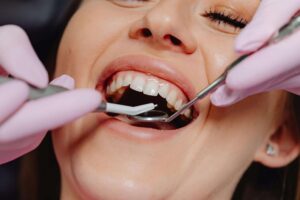It’s reassuring to know there are reputable dental clinics out there that can provide high-quality emergency dental care, should you ever need it.
However, it’s just as important to be aware of how to protect your teeth and prevent dental emergencies. Being proactive, rather than reactive, with your oral health can help avoid a lot of pain, hassle, and unplanned dental visits in the long run.
So, here are some of the best dental emergency prevention tips:

Seeing your dentist and oral hygienist on a regular basis can help ensure any emerging issues – such as tooth decay or gum disease – are spotted early. Such appointments are crucial for proactive dental care – hygienists, for example, can remove plaque and tartar buildup.
Regular brushing, flossing, and the use of mouthwash are all crucial for removing food debris and plaque, thereby keeping your mouth clean and healthy. Failing to adhere to such a dental health routine heightens the risk of tooth decay, gum disease, and later dental emergencies.

If your dentist notices wear and tear of your teeth, this could be an indicator of you grinding your teeth while you sleep. In such a situation, they may suggest you have a custom mouthguard created to protect your teeth from the effects of grinding.
A mouthguard is also an important piece of protective equipment for people who play contact sports. However, you should bear in mind that sports mouthguards are made differently to those created to protect against grinding.
To avoid toothache and broken teeth, remember:teeth are designed for chewing food, not for opening bottle caps or biting down on similarly hard objects!
Using your teeth for the latter purpose increases the risk of chipped, cracked, or broken teeth. It can also wear down your tooth enamel over time.
Sugar is notorious for fuelling the bacteria that causes tooth decay. So, at the very least, avoid consuming sugary snacks and beverages all day – and whenever you do consume them, follow this up by swishing some water around your mouth.
Meanwhile, nutrient-dense foods – especially those with high levels of calcium, phosphorus, and vitamins C and D – help strengthen the teeth and enhance gum health.
If you are in any doubt about visible damage to your teeth or noticeable discomfort, don’t wait to get it looked at by a dentist. The sooner the right intervention is made to address the source of the problem, the lower the chances will be of you needing more invasive treatment later.
If you do need dental care, make sure dental providers are able to easily access information on your medical history and insurance. This can help ensure you benefit from safe and appropriate treatment that does not leave you experiencing financial hardship.
In the event that you experience problems indicating a need for quick attention – such as pain, swelling, or a broken filling – you should make sure you contact your dentist for an appointment as soon as possible.
People with symptoms like these who lack a regular dentist are advised to call NHS 111.

Your dentist can help stop dental emergencies from happening to you in the future. They may do this through interventions such as:
Hopefully, the above advice will have shown that if you’re anxious about dental issues, you don’t need to be! Always remember that if you have any concerns, you’re welcome to contact our team at Fleckney Dental for an appointment.
Back to BlogWe are proud to help our valued patients to transform their smiles through a wide choice of general and cosmetic dental treatments.
Our TreatmentsWe ensure an exceptional patient journey – from start to finish.
learn moreDelivering life-changing smiles and ensuring excellent dental health.
learn moreDental implants and us – together we can recreate a naturally beautiful smile.
learn more